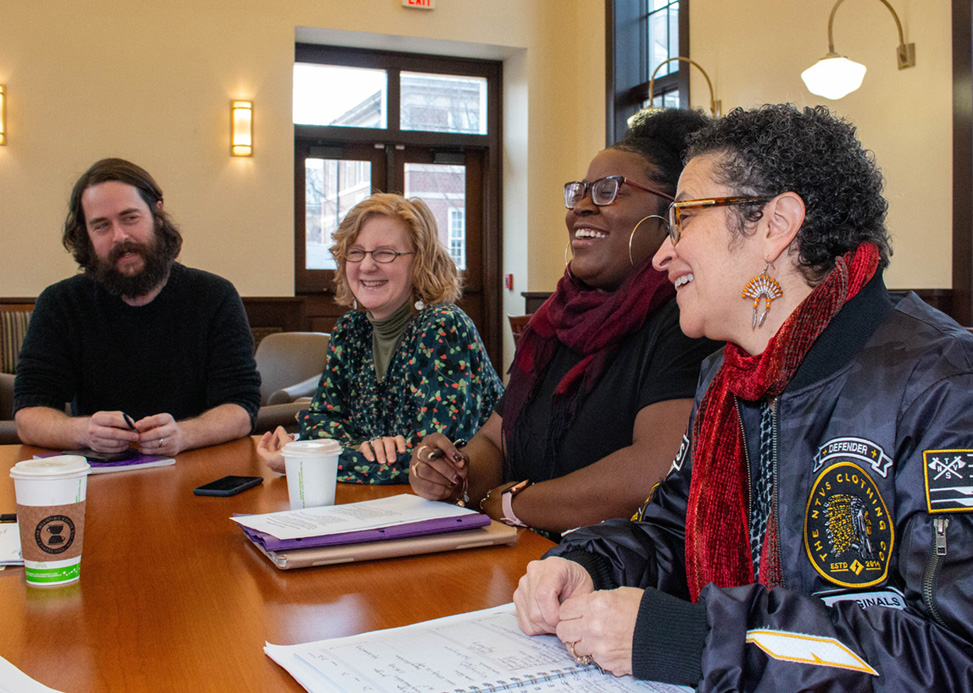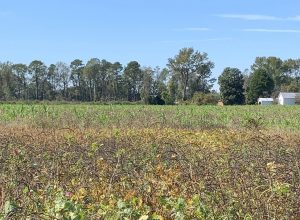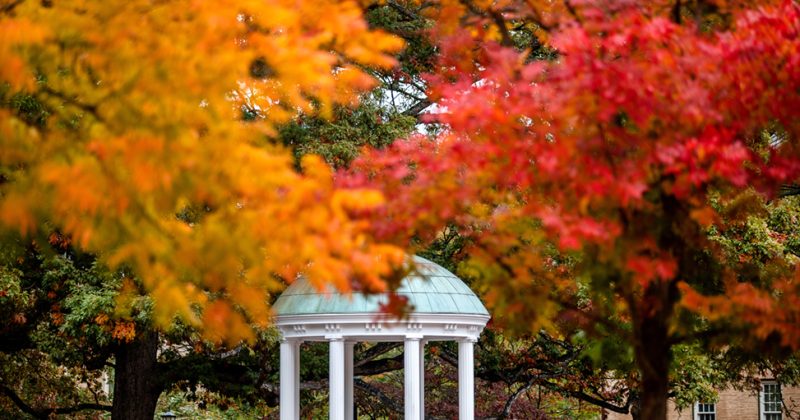
Diamond Holloman (third from left) discusses the resilience and recovery project with Southern Futures colleagues in fall 2019. (photo by Kristen Chavez)
Diamond Holloman is fascinated with what she calls the “sister concepts of vulnerability and resilience” that she has witnessed firsthand among the people of Robeson County, North Carolina.
Hurricanes Matthew in 2016 and Florence two years later brought devastating flooding to the community, located about 90 miles inland from the coast; the Lumber River runs through the city of Lumberton, the county seat. Home to the Lumbee Tribe of North Carolina, it is one of the most racially diverse rural counties in the United States. People are still recovering from those natural disasters and are facing newfound challenges in light of COVID-19.
Holloman, a Ph.D. candidate in the College of Arts & Sciences’ Environment, Ecology and Energy Program, leads an interdisciplinary research project, “Voices of Resilience and Recovery in Robeson County,” as part of a consortium of universities that are examining the impact of climate change through the lens of environmental humanities. Her collaborators include faculty member Jacqueline Lawton in the department of dramatic art and Dylan Clark with the INHERIT Program.
“I hope this project will further amplify the voices of racially marginalized folks in Robeson County,” said Holloman, a Royster Fellow who has been doing community-engaged work in the area for several years. Before coming to UNC, she majored in environmental studies and journalism at New York University and experienced Hurricane Sandy. “These people are not subjects to be researched, but multidimensional, multi-faceted people who are taking the time and energy to advocate for their communities.”

Because of COVID-19, the research group had to pivot its in-person summer research plans. Members are using PhotoVoice, a photography-based humanities research tool that helps participants define issues important to their communities. Community members were mailed cameras and instructed to take pictures inspired by the prompt, “How are natural disasters impacting your lives currently?” Holloman then held Zoom sessions with the community photographers to discuss the photos.
“These PhotoVoice conversations often highlight systemic issues that are happening and allow community members to make connections with others around these shared issues,” Holloman said.
Lawton will work with interested community members to develop a creative response to the PhotoVoice project — a song, a poem, a play, a piece of art or an exhibit, for example. She’s also working with the Robeson County Public Library to bring to light local historical accounts from voices who previously had not been allowed to tell the community’s story.
As a playwright and dramaturg for PlayMakers Repertory Company, Lawton finds this familiar work. Her play Freedom Hill focused on the resilience of the people of Princeville, North Carolina, a historically Black town that has also struggled with devastating flooding after hurricanes.
“Artists illuminate the human condition,” Lawton said. “The humanities can raise awareness about important issues and create a space for empathy and change. That change can show up in, for example, new laws, environmental protections and equitable distribution of resources.”
Both Lawton and Malinda Maynor Lowery, Southern Futures co-director, agree that for scholars, humble listening must be a part of the process.
“Black and Indigenous people in Robeson County who have been impacted by flooding don’t see history as a burden, they see it as a necessary tool, a gift that we can use to address the circumstances before us,” Lowery, a historian and member of the Lumbee Tribe of North Carolina, shared in a video talk among consortium members. “We are not hopeless victims in the face of this. Being able to participate and observe that in these communities is powerful.”
The Coasts, Climates, the Humanities and the Environment Consortium, funded by a grant from the Andrew W. Mellon Foundation, is a partnership of Louisiana State University, the University of Florida, the University of Georgia and the University of North Carolina at Chapel Hill, as well as an alliance of regional stakeholders. In addition to leading Southern Futures, Lowery and Elizabeth Engelhardt, senior associate dean for fine arts and humanities, are UNC co-PIs of the consortium.
Learn more about Southern Futures.
By Kim Weaver Spurr ’88
Read more stories about Southern Futures:
Southern Futures: Diverse voices for a changing region
Southern Futures: Exploring intersections of class and race in Green Valley
Southern Futures: Vulnerable lives on the Matanzas River
Southern Futures: Cultural activism and the fate of Johns Island
Published in the Fall 2020 issue | Features
Read More

Virtually, Viv with Billy Crudup
PlayMakers Repertory Company Producing Artistic Director Vivienne Benesch talks with…

Grad certificate preps students to innovate for public good
A new nine-credit-hour program will launch in spring 2021, teaching…


